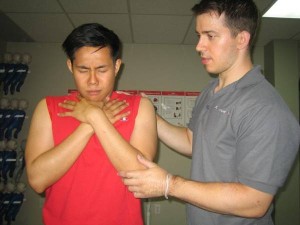Hashimoto’s disease refers to a disorder involving the thyroid gland. The thyroid gland is a small gland situated at the base of the neck, under the Adam’s apple.
The endocrine system comprises of the thyroid gland, which releases hormones that are important for numerous bodily activities.
Hashimoto’s disease is also called chronic lymphocytic thyroiditis. The condition occurs when a person’s own immune system attacks the thyroid gland. This results in inflammation which causes hypothyroidism, an underactive thyroid gland. Hashimoto’s disease is considered to be one of the leading causes of hypothyroidism. The condition generally affects middle-aged women, however, men and women of all ages, and children are likely targets as well.
A diagnosis at the doctor’s office will help identify Hashimoto’s disease. Treatment usually involves hormone replacement therapy.
Signs and symptoms
Hashimoto’s disease does not come with its own set of distinct signs and symptoms. The disease normally just develops slowly and may take more than a number of years to cause significant thyroid damage. This results in a drop in hormone levels in the blood due to an underactive thyroid gland.
Signs and symptoms may vary according to the severity of thyroid hormone deficiency. Initially, signs and symptoms like fatigue may not be noticeable or you may not identify them as you grow older. However, the condition does progress, resulting in more damage and more identifiable signs and symptoms such as:
- Fatigue and weakness
- Sluggishness
- Constipation
- Increased sensitivity to cold weather
- Puffy face
- Pale and dry skin
- Husky or hoarse voice
- High blood cholesterol level
- Muscle aches
- Unexplained weight gain
- Depression
- Stiffness and pain and discomfort of the joints and muscles – especially of the hips and shoulders
- Prolonged menstrual periods in women
Signs and symptoms slowly worsen, if left untreated, thereby resulting in an enlarged thyroid gland or goiter.
When to seek medical attention
See your doctor if the following problems occur:
- Dry and pale skin
- Pale and puffy facial skin
- Constipation
- Unusual lethargy
- Husky voice
Periodic testing is required if:
- You have undergone thyroid surgery
- You have had radiation therapy of the neck, head or upper chest
- You have been treated with radioactive iodine
- You have been treated with anti-thyroid medications
For people with high blood cholesterol levels, talking to your doctor about hypothyroidism being a cause may be helpful in determining early treatment.
Treatment
Treatment primarily includes periodic testing, observation and medications. If you do not show and signs and symptoms of Hashimoto’s disease or if there if tests do not show hormone deficiency, thus indicating that your thyroid gland is working normally, you may be directed to employ the wait-and-see method. If a person needs medications, he will most likely have to use them for the rest of his life.

